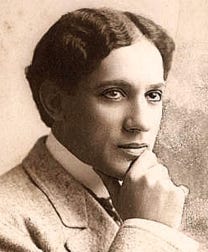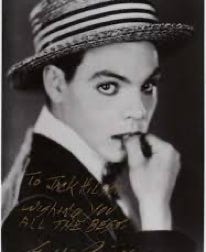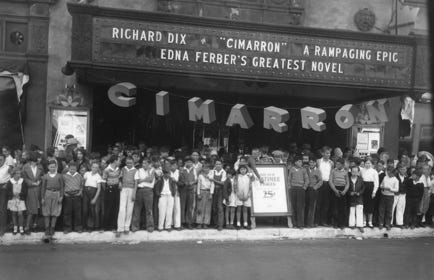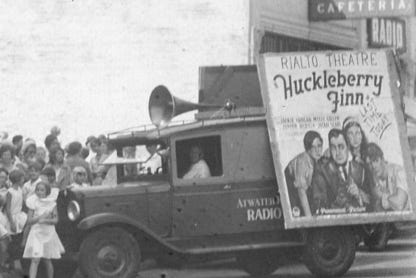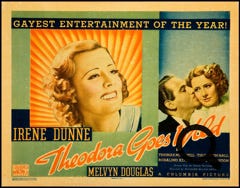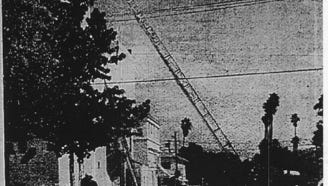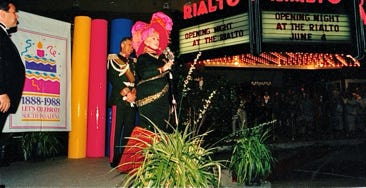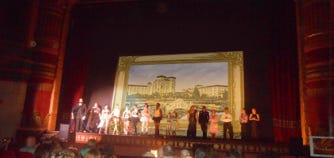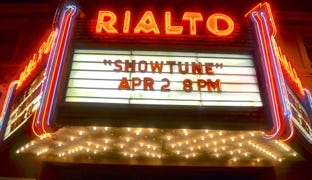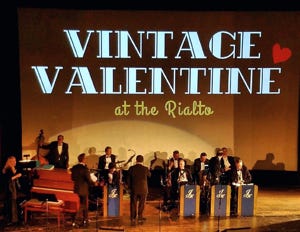1924
October 24 - The South Pasadena newspaper notes that permit was granted for $110,000 theater to be built at Fair Oaks & Oxley. That story refers to the building as “Moorish Design,” while the Pasadena Evening Star calls it “of Buddhist Design.” To provide context for the cost, the average home in South Pasadena was $5,100; a modest 4-room home was $2,500, and a high-end permit was for $12,000. On the other hand, in nearby Pasadena, theatres were costing up to $750,000. And the most expensive theater built on a per seat basis was The Los Angeles in downtown LA, at $1.5 million, completed in 1931.
1925
October 17 - Gala opening of “South Pasadena’s Finest Community Theater” – The Rialto. Featuring “The World’s Premiere Showing of a 1926 Photoplay Feature and Five Snappy Vaudeville Acts”. The Opening Night premiere of “What Happened to Jones” with star Reginald Denny and Director William Sieter in attendance
1928
January 6 - Grand opening of The Rialto Sweeteria at 1021 Fair Oaks Ave.
April 11 - Famous character actor Sheldon Lewis at the Rialto in Dr. Jekyll & Mr. Hyde, one night only
April 13 - Comedian Eddie Quillan of Mack Sennett Studios appears at Rialto.
September 14 - “Now Under Independent Management” proclaims ad. Promises Vaudeville every Saturday and Sunday, plus an orchestra
1929
March 15 - Rialto closes for two weeks to install new sound system for “Talkies”. $15,000 investment provides both Vitaphone (disc) and Movietone (optical film sound synchronization), two of four competing sound systems of the 20’s. Two projectors were rigged to instantly switch between the two sound systems. [Fox Film Company, which owned Fox West Coast Theatres Inc., the managers of the Rialto, went bankrupt in 1936 largely due to the cost of outfitting over 1,250 theatres for sound during the Depression.]
March 31 to April 6 - Famous Mystic Ali-Din appears at Rialto. “Known in all countries as ‘the man who knows,” the mystic appears each evening, and on Thursday he conducts his Bombay Séance, for ladies only. On Wednesday at noon he drives a car blindfolded from The Rialto through Highland Park.
April 5 - Rialto debuts its new sound system with Manager Halph Horsman announces “only the best of talking features . . . twentyone days after LA showings” First talkie shown is Paramount’s comedy “The Dummy”. “A battery of four double-throated horns situated on stage back of a porous screen, through which the sound is carried,” is how the newspaper described it. They also said that an observer was situated in the audience with a telephone connected to the projection booth for volume control. Cost of installation was $15,000.
April 12 - Bandits hold up Assistant Manager Arthur Buckley at the Rialto
May 10 - Ad reads “Direction by S. Lazarus”, who also operated the Million Dollar Theatre, the Alhambra, the Circle Theatre and The Strand in LA. Ads point out “Talkies” and silent pictures.
October 24 - Black Thursday – Stock Market Crash. Economy changes dramatically and Fox Films sees stock drop from $119 to $1 per share. By 1932 movie attendance had dropped 50% and 1/5 of the 20,000 theatres nationwide closed.
1930s
Dominick Jebbia, known as The Banana King because of his success as a fruit distributer, obtains the Rialto Theatre property. A resident of Monterey Park, Jebbia also purchased the Midwick Country Club for $178,000 in cash in the 1940s, apparently with a grudge that he had been excluded from membership. He later developed the property as single-family homes.
1930
June 14 - “Grand Opening of Vaudeville” ad promises five high class professional acts every Saturday & Sunday along with Movietone photoplays and newsreels
June - Manager of Rialto Halph Horsman promoted to manage all five theatres in the Lazarus chain. Frank Hurst, the Rialto Organist for two years, takes over. Hurst was a Vaudeville headliner. He started the Rialto Brownie Club with the South Pasadena Woman’s Club
June - “The Very Best talent in Vaudeville is booked at The Rialto,” as acts starting at the Million Dollar Theatre then play the Rialto.
November 21 - Earphones installed at The Rialto
November 28 - Manager Frank Hurst returns to The Rialto after a hiatus of several months
1931
April 4 - Cimarron plays at The Rialto. Epic film with major publicity.
September 25 - Huckleberry Finn movie plays the Rialto.
1932
January 15 - Rialto hosts a conference on films. Ralph Horsman listed as manager.Topics include “Ethics of Publicity” and “The Effect of Motion Pictures on the Child.”
1937
Jan 1 - Gala New Year’s Eve Frolic at the Rialto featured a special Vaudeville show with Gene Morgan as master of ceremonies and Joe Cascales and his Hollywood Orchestra plus six big acts.
The move was “Theodora Goes Wild” with Irene Dunne.
1938
May 20 - At 5:45 a.m. firemen responded to a call to put out a fire in the Rialto, thought to have been caused by a smoldering cigarette in the balcony from the night before. $500 in damages occurred, ruining about 35 or 40 seats were burned and fixtures destroyed. But the Theatre was not closed.
Nov. 4 - New manager takes charge of the Rialto. “Dick Smith, formerly of Fox Theater in Phoenix Arizona, where he has been manager for the past two years, arrived in South Pasadena during the week to take charge of the Rialto Theatre, the active operation of which has been assumed by Fox-West Coast Theatres, which have been financially interested in the popular movie house since it was opened thirteen years ago” says a story in the local paper. He announced big plans for a remodel.
Permits are pulled for lobby remodel
1971
November 1 - South Pasadena Review reports on fire at the “massive Rialto.” Firefighters went in through the roof.
1972
July 12 - Rialto opened again after 8 months of closure after a fire that damaged the organ, which was removed. The re-opening movie was “Duck You Sucker” with James Coburn.
1974
Community Redevelopment Agency (CRA) and architectural consultant Whitney Smith recommend development of four downtown blocks encompassing the Rialto site.
1975
CRA Plan Approved as Downtown Revitalization Project No. 1. Plans would be for a mini-mall anchored by a Sav-On drug store. The Rialto would be razed to create 45 parking spaces.
1976
Rialto lease acquired by Parallax Theatres, regional art house chain with 18 theatres in six states. Ultimately, they would become Landmark Theatres.
1977
May 19 - Cultural Heritage Commission nominates the Rialto Theatre for Official Historic Register
July - City Council designates the Rialto a city landmark but rescinds the decision a short time later.
November 23 - Letter to the Editor, South Pasadena Review
Dear Sir,
Few towns can boast an Orpheum, Tivoli, Bijou, Lyceum, a Rialto. Fortunate South Pasadena! Let’s preserve our magic Rialto – where a lot of us discovered Necking and Arts Decoratifs simultaneously.
Sincerely, Jeanne Hughes Beley
November 28 - Rescue Rialto meeting held at the home of Kay Bowers, after a petition was signed by concerned citizens
November - City Council approves city landmark status. Stuart Denker is Chair of the Cultural Heritage Commission at the time. Groundbreaking occurs for The Orangery Shopping Center, apparently with the fate of the Rialto still in flux.
December 12 - Rescue Rialto argue that tearing down the Rialto for 45 parking spaces would cost $542, 252, — or $12,050 per space — more than double the rule of thumb considered prudent at the time. The costs included land acquisition, lease buy-out, demolition, fill dirt, paving and landscaping.
December 21 - South Pasadena Review reports that Cultural Heritage Commission unanimously nominated the Rialto as a local landmark. Two notification letters submitted, one by Dr. Knox Mellon, state historic preservation officer.
1978
January 2 - San Marino Opthamologist Nathan Roth (Father of rock legend David Lee Roth) pledges to buy the Rialto and produce local plays. Roth, who lived on Orange Grove Ave. in Pasadena, states that he has wearied of trying to buy the Pasadena Playhouse, which is in much worse shape than the Rialto. Roth was a theater major at Indiana University, and got his MD at Harvard and Tufts. He praises the local preservationists, promises community involvement, and puts films first, then live theatre. Roth did eventually purchase and run The Raymond Theater in Pasadena, known as Perkins Palace for a time, which drew headliners in the 70’s & 80’s.
January 6 - State Historic Resources Commission grants Rialto historic landmark status.
January 7 - Rocky Horror Picture Show first plays at the Rialto at Midnight
February 1 - Mayor AlvaLee Arnold endorses inclusion of the Rialto in the CRA plans for The Orangery. Nathan Roth’s plans to buy the theatre are delayed. It notes that he intends to open a 99 seat theatre in the second story, and occasionally use the main stage for live performances. Incidentally, in February 1978, Van Halen released their debut album, launching son David Lee Roth’s superstardom.
February 20 - Robert Wagner, developer of the Vons strip mall, presents a proposal to City Council for downtown development in which he “forsees demolition of the Rialto Theatre as essential to redevelopment.” Another developer, Lundin and Hutton, proposes a plan to save both the Orangery and the Rialto, but no decision is made.
March 1 - CHC Chair Stuart Denker calls for Rialto preservation and notes that candidates for upcoming City Council elections should clarify their views on the issues before the election. CRA revisits plans to try to incorporate Rialto. City Council votes 3-2 to save The Rialto.
July 26 - Rialto placed on National Register of Historic Places, the seventh site in the City with that distinction.
1979
January 24 - “New Reprieve for Rialto Theatre” states a local paper headline in a story about a recent CRA meeting. A letter from a prominent LA Times film critic and an overflowing crowd at City Council Chambers showed wide support for saving the theatre. Two councilmembers expressed doubts, and urged action if would be preservationists wanted to save the theatre.
January 24 - SP Review reports that overcrowded CRA meeting previous week was highly partisan toward saving the Rialto from a reluctant CRA, ending with the Rialto being given a reprieve. Herb Barnes of the Rescue the Rialto Committee coordinated efforts and Ray Grivigian, chairman of the State Historic Building Commission, presented information on tax incentives and grants to save the theater. A petition with 3,274 signatures was presented to the CRA and the current owners of the lease, Parallax Theatres. Carl Graham, director of operations claimed they had “bought the property just last month” and prior to that had only leased it. He pledged a major portion of their resources over the next 12-24 months to restore the Rialto. Parallax controlled 18 theaters in six states. Parking was recognized as a problem, since the Rialto had none.
Letter from LA Times Film Critic Charles Champlin pleads for restoration of Rialto, saying he “cast a vote for its continued existence.” He identified the Rialto as an architectural landmark and a revival house for important films.
1983
Friends of the Rialto is formed as a committee of the South Pasadena Preservation Foundation.
1985
October 19 - Friends of the Rialto produces 60th Anniversary Gala with Phantom of the Opera with live Organ Accompaniment by Robert Israel.
Balcony closed.
1986
October 5 - After ten years, the Revival House format is abandoned by Landmark Theatres in response to growing videocassette and cable TV market. “We can’t compete with people’s living rooms” explains theatre manager Mark Weber. The Rialto switches to first-run, independent art films.
LA Times Article by Judy Romberger
1988
June 4 - Friends of the Rialto and Landmark Theatres partner with the City of South Pasadena to celebrate the city’s Centennial. Fair Oaks is closed off to traffic and the crowd gathers in front of the theatre to watch celebrities including ZsaZsa Gabor and her husband, Prince Frederic von Anhalt..
2007
August 19 - Last regular showing at the Rialto, Simpsons: the Movie
December 29 - Rocky Horror Picture Show plays at the Rialto at Midnight for the last time Celebrating 30 years
2010
March - Rialto is “red tagged” for safety and fire code violations
2015
January - Rialto sale to Izek Shomof is announced
January 19 - Escott Norton with Friends of the Rialto gives new owner Izek Shomof a tour of theatre
October 17 - Friends of the Rialto produces “90th Anniversary Gala”
2016
April 2 - Friends of the Rialto produces live Broadway musical revue ; “Showtune”
December 17 - Friends of the Rialto produces “12 Acts of Christmas” variety show
2017
February 11 - Friends of the Rialto produces “Vintage Valentine” with the Johnny Holiday live big band, and Singing in the Rain on the big screen
April - Lease is signed with Mosaic Church
August 24 - Friends of the Rialto co hosts a screening of LA LA Land at the South Pasadena Public Library with a Q&A with Oscar winning production design team David Wasco and Sandy Reynolds-Wasco.
October 22 - Mosaic holds first service in the Rialto
December 17 - Mosaic presents “It’s a Wonderful Life”
2018
May 18 - Mosaic presents “Back to the Future”
July 28 - Mosaic presents “Nacho Libre”
August 24 - Mosaic presents “LA LA Land”
October 20 - Mosaic presents “Ghostbusters”
December 22 - Mosaic presents “Elf”
2019
February 16 - Mosaic presents “The Notebook”
December 21 - Mosaic presents “Miracle on 34th Sweet”
2020
January 15 - Rialto owners start work on Exterior Restoration
November 23 - Neon is reinstalled, Exterior Restoration is essentially complete.
2021
August 25 - Mosaic Church opens doors to reveal new renovation work.
2025
October 17 - Rialto Theatre History Display unveiled at the South Pasadena Historical Museum.
October 18 - RIALTO 100 Street Fair as part of the South Pasadena Fall Arts Crawl - 3pm-9pm

